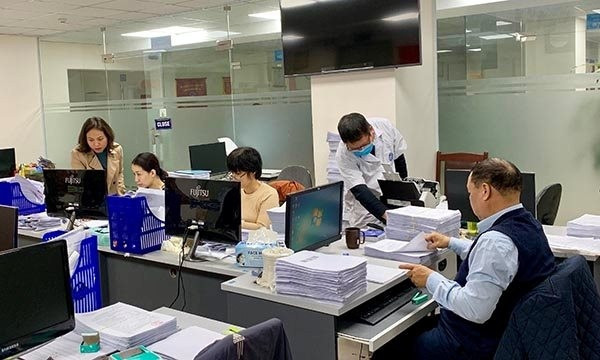 |
| Digital archives are needed for the development of the e-goverment, digital society, and digital economy. - Photo courtesy of FPD |
Digital archives are an essential aspect of modern governance and societal development, particularly in the context of e-government, digital society and the digital economy.
With the promulgation of the amended Law on Archives, Việt Nam aims to institutionalise the promotion of information technology (IT) to advance sustainable development and international integration. This law emphasides the need for digital archiving as part of the broader digital transformation (DTS) effort, recognising its importance in preserving legal evidence and valuable information for future generations.
Challenges and context
During a recent conference on 'Digital Archives - The Next in Archive' held in Hà Nội by FPT IS and the Vietnam Association of Records and Archives early August, Đặng Thanh Tùng, director of the State Records and Archives Department, highlighted the critical role of digital archiving amid rapid digital transformation.
He noted the vast amount of data generated daily necessitates modern storage solutions to replace outdated manual methods, which carry risks like document degradation and loss. The amended Law on Archives 2024 sets higher standards for managing digital documents, urging businesses and organisations to adopt effective digital archiving practices promptly.
Recently, the Archives Law (amended) was passed, introducing new requirements for various types of electronic archival documents and establishing technical standards for digital document management systems and digital archives to enhance the value of archived documents.
Data is an asset and the foundation for organisational development. The data journey, from managing executive documents to current archives and submitting to the Provincial Historical Archives and the National Archives, must ensure synchronisation according to the standardised Archival Information Package to optimise the management, sharing, utilisation and recovery of data.
Sharing view at the conference, Hoàng Quốc Tuấn, chairman of the Vietnam Archives Association, emphasised that the State is setting new requirements for the management, protection and promotion of archival documents. He underscored the urgency of digital transformation in archival activities, stressing the need for a clear legal framework, compatible technological infrastructure and capable human resources.
Dr. Nguyễn Thị Chính, head of the Department of VTLT II Management, provided insights into the amended Law on Archives 2024. The law introduces several new points and regulations regarding digital archiving. It outlines the requirements for archival document databases, digital archives and technical standards to ensure effective implementation by agencies and organisations.
Chính identified challenges such as the lack of electronic archiving systems, under used digitalised records, and issues related to security and storage technology.
Solutions and future directions
The amended Law on Archives paves the way for significant changes in archival practices, aligning them with digital transformation requirements. A notable initiative is the National Digital Archives platform, developed in collaboration with FPT IS and following the open OAIS model. This platform aims to provide a comprehensive and reliable solution for digital archiving.
Nguyễn Hoàng Minh, general director of FPT IS, highlighted the importance of digital transformation and the expected exponential growth in archived documents by 2050. He expressed pride in FPT IS's role in implementing the OAIS standard and contributing to the development of Việt NAM's national digital archive system.
FPT IS has been a key technology partner, offering solutions to address national and local archival challenges. Their expertise and innovative solutions are crucial for supporting organisations in adapting to the new requirements set by the amended Law on Archives.
The 2024 Archives Law represents a significant shift in how archiving is approached, particularly with the increasing role of technology in digital archiving. FPT IS, with its long history of supporting national and local archiving efforts, shared insights into technological advancements that can facilitate compliance with the new regulations.
Nguyễn Trung Hiếu, director of ArchiveNex Digital Storage Solution at FPT IS, elaborated on the current challenges in electronic archiving. He noted that despite growing interest in digital archives, many agencies and organisations still lack a well-structured digitalisation and storage management system that meets three critical objectives: safe storage, long-term preservation and effective exploitation. — VNS